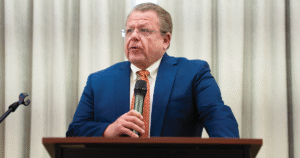
Editor’s note – Unfortunately, due to the timing of our issues, we were not able to get this recap of the extended Florida Legislative Session that finally ended on June 16 into the June 24 New Tampa issue, but I did sit down for a chat with District 67 State Representative and Florida House Minority Leader Fentrice Driskell (photo) a little more than a week after that lengthy session ended to get her impressions of the hits, misses and what the people of her District, which includes all of New Tampa, can expect between now and the start of the 2026 Legislative Session next January. — GN
NN: First, give me your general impressions of this year’s session.
FD: To me, this felt like a session of missed opportunities, because the Speaker set a tone at the beginning of the session, that it was going to be a member-driven process and that we were going to focus on affordability issues, and basically there would be opportunities to collaborate on such issues. But in the end, this session was marked by, in-fighting amongst Republican leadership. The Speaker of the House, the Senate President and the Governor just could not seem to get on the same page, so what was supposed to be a 60-day session wound up being over a hundred days. And unfortunately, the budget was the biggest bargaining chip and the budget process was held up and it wasn’t as transparent as it typically is, meaning that there wasn’t really the opportunity for the public, I don’t think, to advocate, as much as they specifically would have for their budget appropriations. It was really tough — for the public and for lawmakers — because we also were kind of pretty much in the dark. It just seemed like they couldn’t even agree on even whether or not they were fighting, much less what they were fighting about. In spite of everything, though, I think, in the end, it was an O.K. budget. Definitely not an A+ budget, but it was an O.K. budget.
NN: What’s missing from the budget?
FD: What I would like to have seen that was missing were more funds for housing affordability. By my estimation, we actually reduced funds for affordable housing and this is not a time to do that. Especially here, when we know the Tampa Bay area is one of the fastest-growing regions in the country, and it’s becoming too expensive for locals to live here.
You’ll also notice that the Governor vetoed a number of water projects, just like he did last year. The problem with that, as we continue to endure stronger storms and flooding events, is that we need to have the right infrastructure to try to protect human life and property.
NN: What do you see as your caucus’ victories, despite the Republicans’ super-majority?
FD: In the end, they actually kept the funding for Advanced Placement courses and International Baccalaureate programs and certain certifications for students. And I think that was the right thing to do. And I give full credit, both to the Democratic caucus and to the public for really springing into action and embracing a lot of noise about that, so that they had to reverse course. I am really proud of our advocacy for students and families on the AP classes. We really hammered them on that, which was good.
NN: What about your own successes?
FD: I was really proud to secure some significant appropriations. For example, in a prior session, I helped sponsor legislation to establish what we believe are the first Sickle Cell Disease Centers of Excellence in the country.
So this year, we were able to secure $3.75 million for sickle cell disease projects — $1.25 million to establish a “cause of death initiative” aimed at addressing a long-standing gap in knowledge surrounding sickle cell disease mortality. There hasn’t been enough study and focus to understand the exact causes of death for many in the sickle cell population. We’re trying to understand more about what happens to sickle cell patients and try to strengthen advocacy efforts.
Then, there’s another $2.5 million that is going to help that population with non-emergency transportation access because what we found is that transportation is a huge obstacle to that patient population from getting consistent preventive care. They miss a lot of appointments. When that happens, you know, things that were preventable become real complications, and they have worse outcomes.
This is going to allow for two transportation vans at each of the 15 sickle cell centers, including the one in my District on E. Fletcher Ave.
The other thing that we did get was a $350,000 appropriation for the Hillel Jewish Student Center of Tampa on the USF Tampa campus. We’ve heard stories of students feeling threatened on campus. Probably like a month or two ago, there was a gentleman found with weapons on campus, who was not a student, and he had a copy of I believe it was Mein Kampf.
There’s been an uptick of anti-Semitism, so we’re very proud to help our students feel safe. The appropriation is for school “hardening” and some technology, plus educational and cultural programming to try to counter disinformation and anti-Semitic rhetoric. The daughter of one of my colleagues in the legislature is half-Jewish, half-Black, and she used to wear a Star of David at school. But, there were some things happening at school and now, she doesn’t even feel safe to wear to wear her star anymore. And, she’s only in middle school.
There also was some drama this year where the Senate’s Democratic leader — Jason Pizzo — resigned his leadership position part-way through session and announced that he’s becoming an NPA. It was very dramatic. I’ve been in this position now for about three years, and I’ll tell you that leadership is hard. There’s no glory in it. It sounds like a very nice title, but it’s tough. And, for whatever reason, he’d had enough. So then, the Senate elected Lori Berman unanimously as its new leader and I will tell you that Sen. Berman and I work together really well. And, from that point on, I’ve found that we’ve been very coordinated. The Senate and House Democrats are already working on a joint platform for next Legislative session, because we recognize that we’re stronger together.
And, we did have some platform bills that we worked together on this year, particularly related to housing affordability, expanding Medicaid, safe gun storage and universal background checks. These are things that are not easy to pass, but I do think it’s important to raise them so that we are a part of the conversation, and so that we keep trying to keep the conversation centered on affordability, because that’s what our constituents want. The most calls that we get are people worried about housing affordability and dealing with property insurance. And, even though we’re the minority party, I think it’s important that we uplift the voices of our constituents and our neighbors.
NN: Which bills of yours didn’t pass?
FD: I had a bill that was seeking to give clarity and direction to doctors with respect to the six-week abortion ban because we continue to hear reports of doctors being unsure of what they can do with respect to miscarriage management because, technically, that could be considered an abortion procedure sometimes. So, in consultation with physicians who practice in this area, we worked on a bill that would just give them some guidelines. Unfortunately, it didn’t pass.
Recently in the news, there was a Republican Congresswoman here in Florida who suffered an ectopic pregnancy, and she was having difficulties getting health care because the doctors weren’t sure what they could do. So, this is something that really has a need. That’s a dangerous thing to have an ectopic pregnancy and to have a doctor not know if he or she can provide care for that. I may not be the one who carries it, but we’ll definitely bring it up again next Session.
There was also a bill that I carried on water quality improvements. It actually was a platform bill for our caucus. I read a report that Florida is one of the states with the highest amount of lead in our drinking water. So, I was pushing for a study, so that we could better understand the issue and start to remedy this. The bill also is basically asking for the state to implement the recommendations that were made by the Red Tide Task Force that looked at that issue. But, when something is a big hot topic in the moment, the legislature will take action, but then, maybe once the news coverage dies down, they just put things on the back burner. But, our beaches are critical to our economy, so maybe we should be more preventive with it. That was a real disappointment that we couldn’t get that to go anywhere because environmental issues have been fairly bipartisan in recent years.
NN: So, you have one more legislative session in your current role before you’re term-limited out. What’s your next political move?
FD: I have just “officially announced my campaign for Florida State Senate District 16,” which currently is occupied by Darryl Rouson, who also has reached his term limits. (Note-The Dist. 16 seat doesn’t include New Tampa.)




No comment yet, add your voice below!